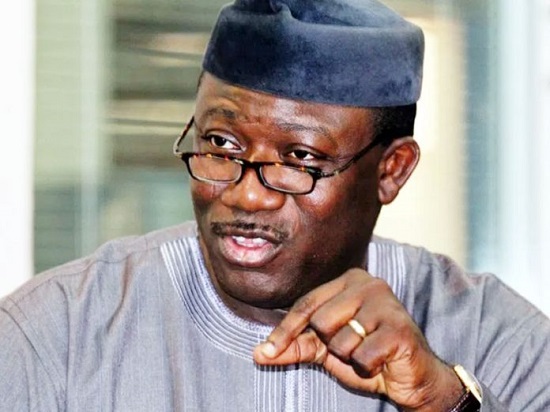Ekiti State Governor, Dr. Kayode Fayemi, has advocated ‘a comprehensive national response’ to win the battle against insurgency, banditry, kidnapping and all other forms of security challenges afflicting the polity.
He also called for massive investment in public health, nutrition, education, promotion of partnerships for affordable housing, food security, potable water and creation of enabling environment to put opportunities for skills acquisition and gainful employment for the youths to reduce violent crimes in the country.
Fayemi, who is also the chairman of the Nigeria Governors’ Forum (NGF), spoke as the guest lecturer at the 2022 Murtala Muhammed Foundation Memorial Lecture held at the Shehu Musa Yar’ Adua Centre in Abuja yesterday to mark the 46th anniversary of the assassination of former Head of State, late General Murtala Muhammed.
Delivering a lecturer titled: ‘Beyond Boko Haram: Addressing Insurgency, Banditry and Kidnapping Across Nigeria’, Fayemi said concerted and collective efforts must be put into the fight against security challenges, which have afflicted every nook and cranny of the country.
While sounding the battle cry against the challenges at hand, the Ekiti State governor regretted that “the boundaries of contemporary national insecurity have been further enlarged by the emergence and expansion of an industry in kidnapping that has overwhelmed an important swathe of the Northwestern Nigeria and graduated into the status of a national pandemic.”
Extolling the virtues of the late Muhammed, Fayemi noted that although the former Nigerian leader was in office for a very short time, he made a lasting impact and embodied the lesson which all public office holders must always be reminded of.
He said: “For my generation of Nigerians, the late General Muhammed was not only a charismatic leader whose decisive, no-nonsense, and business unusual style captured our youthful imagination, he has also over the years remained an uncommon example of public service through the uncompromising commitment he displayed to the pursuit of the common good.
“As with most other Nigerians, the deep regret which we felt was that he did not lead long enough to personally complete the task of national rebirth which he and his colleagues had defined for themselves at the time he came to power. Still, he earned his place in our hearts and in the pantheon of our national heroes.
“Murtala Muhammed successfully re-ignited hope in a post-civil war Nigeria that we can as a people aspire to new and greater heights to occupy our rightful place in dignity as a leader in the comity of nations. Such was the impact he had in so short period of time that memory of his time with us remains so fresh and evergreen. May his soul continue to rest in peace, amen.”
Dissecting the issue of the day, Fayemi noted that Nigeria had grappled with various forms of security problems, including armed robbery, militancy, vandalism of oil pipelines and hostage taking, ethno-religious killings, but had recently exacerbated with insurgency, kidnapping and banditry.
The governor explained that the security challenges facing the country should not be seen as problems of particular geopolitical zones but as a national issue all Nigerians, including the leaders and the led, must join hands together to tackle in order to restore confidence in the polity.
Giving suggestions on how to the problems can be successfully tackled, the governor said issues underpinning the country’s security challenges must be addressed as well as emphasising on forging of a new compact between the state and the society whose centrepiece must be an inclusive and expansive project of human security in the land.
He identified sustained job creation as a panacea to youth involvement in criminal activities and susceptibility to being indoctrinated and conscripted into antisocial organisations to wreak havoc on their fatherland, suggesting that the government, private sector, and non-governmental organisations must be involved in the task.
Fayemi said: “If an all-encompassing social compact has become an urgent imperative in our quest to look beyond Boko Haram towards an all-round national rebirth, it must go without saying that we have to pay special attention to employment creation on a mass scale so that our bid for socio-economic progress can stand a chance of being achieved.
“I am here particularly concerned as you about the role which employment can play in helping the burgeoning army of young Nigerians to build character, enhance personal dignity, eschew crime, lead innovation, and sustain hope for a better future whilst contributing productively to the development of the country.”
Fayemi added: “From massive investments in public health, nutrition, and education to the promotion of partnerships for affordable housing, household food security, and efficient means of mass mobility, the supply of potable water and electrical power in our cities, towns, and villages, and the creation of enabling conditions for any and every citizen to acquire the civics and skills necessary for navigating life in dignity, there has to be renewed drive to ensure that there is a concrete and meaningful bargain in being a Nigerian.
“Clearly, the leadership in the most affected state in the Northeast, Borno, has been up to the task in terms of its response to forging a new compact between state and society. Yet, in spite of the best efforts of my brother, Borno State Governor, Babagana Zulum, and his government following in the footsteps of former state Governor, Kashim Shettima, it’s clear that what is required is a comprehensive national response, not an isolated state strategy.
“And I believe this must also include a whole of country sensitisation programme that understands and subliminally internalises the problem as one that will consume all of us if not addressed, and not a challenge that is exclusively Borno or Kanuri-centric.”



